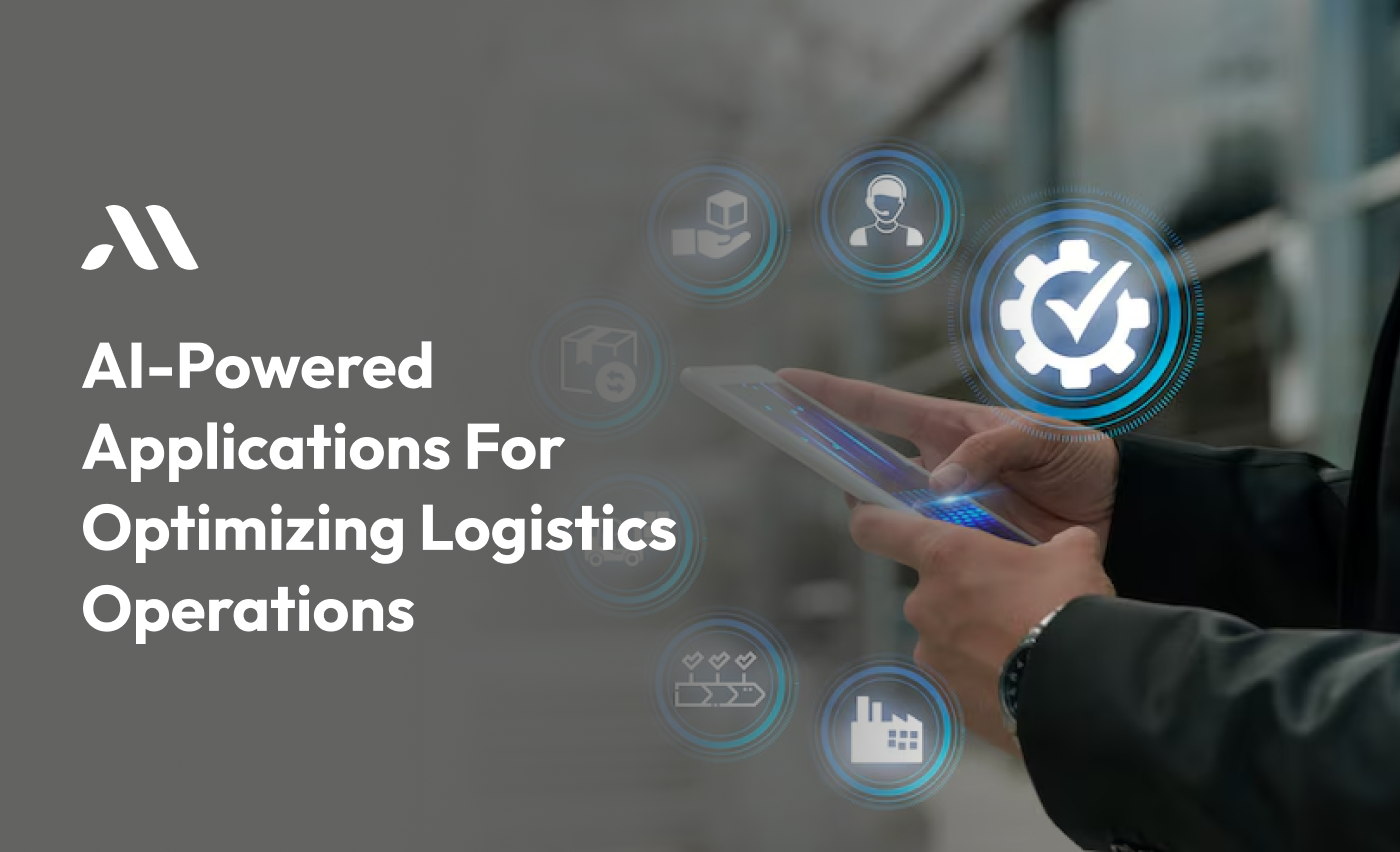In today’s fast-moving world, logistics operations are the backbone of many businesses. From delivering products to customers on time to managing warehouse inventory, logistics plays a vital role in ensuring smooth business processes. However, as companies grow, handling logistics can become complicated. This is where AI-powered applications come into play, helping to make logistics operations easier, faster, and smarter.
In this blog, we will dive into how AI-powered applications transform logistics operations and make life easier for business owners like you.
- Companies that use AI-powered applications see a 15% increase in efficiency.
- AI-powered applications can reduce fuel costs by up to 12%.
- Automating warehouse management with AI can cut down human errors by 25%.
What Are AI-Powered Applications?
AI-powered applications are tools or software that use artificial intelligence (AI) to perform tasks normally requiring human intelligence. These tasks include decision-making, predicting outcomes, and learning from data. In logistics operations, AI-powered applications can help businesses manage and optimize different processes, from route planning to demand forecasting and even warehouse management.
According to a 2023 study by McKinsey, businesses that use AI in their logistics operations see a 15% increase in efficiency and a 10% reduction in costs.
Why Use AI-Powered Applications in Logistics Operations?
Improved Efficiency AI-powered applications can perform tasks faster than humans. For example, AI can analyze traffic patterns and predict the best delivery routes, which helps reduce delivery time and fuel consumption. This level of efficiency is crucial for businesses that depend on logistics operations to get products to their customers on time.
Cost Reduction AI can help logistics companies save money. By optimizing routes, reducing fuel consumption, and lowering the need for manual labor, AI-powered applications cut down on operating costs. A report by Forbes highlights that companies using AI-powered logistics saw a 12% decrease in fuel costs.
Better Customer Satisfaction Customers expect fast and reliable deliveries. With AI-powered applications, logistics companies can ensure on-time deliveries by predicting potential delays and finding the best routes. This not only improves customer satisfaction but also boosts the company’s reputation.
Accurate Demand Forecasting One of the biggest challenges in logistics is predicting future demand. AI-powered applications use historical data and market trends to forecast demand accurately. This helps companies avoid overstocking or understocking, which can lead to unnecessary costs or missed sales opportunities.
How AI-Powered Applications Work in Logistics Operations
AI-powered applications play a key role in different aspects of logistics operations. Let’s look at some examples:
1. Route Optimization
AI-powered applications analyze traffic data, road conditions, and weather forecasts to determine the most efficient routes for deliveries. By optimizing routes, businesses can reduce delivery times and fuel costs.
Tip: Many logistics companies use AI-powered applications to monitor real-time traffic updates and re-route vehicles if there is heavy congestion.
2. Warehouse Management
AI-powered applications help manage warehouse inventory efficiently. They can track stock levels, predict demand, and even control robotic systems for picking and packing orders. This helps reduce human error and ensures the smooth running of logistics operations.
Remember: Automating warehouse management with AI-powered applications can reduce human errors by up to 25%, according to a report by Deloitte.
3. Predictive Maintenance
Logistics operations rely heavily on trucks and machinery, which need regular maintenance. AI-powered applications can predict when maintenance is required by analyzing data from vehicles and equipment. This helps avoid breakdowns and costly repairs, keeping logistics operations running smoothly.
4. Real-Time Tracking
With AI-powered applications, logistics companies can provide real-time tracking information to customers. This helps improve transparency and helps customers to know exactly when their package will arrive.
Note: Studies show that 70% of customers prefer companies that offer real-time tracking, as it improves their overall experience.
How an App Development Company Can Help
Building and integrating AI-powered applications into your logistics operations might seem complex. This is where an app development company specializing in AI technology can assist. An app development company can design custom solutions tailored to your specific needs. They can integrate AI-powered applications into your existing systems, train your team to use them, and provide ongoing support.
Here’s how partnering with an app development company can help:
Custom Solutions Every logistics operation is different. A good app development company will create AI-powered applications that fit your business’s unique requirements.
Integration with Existing Systems The last thing you want is to disrupt your current logistics operations. An experienced app development company can smoothly integrate AI-powered applications with your existing software, ensuring minimal downtime.
Ongoing Support and Updates Technology is constantly evolving, and your AI-powered applications should evolve too. An app development company provides ongoing support and updates to ensure your logistics operations remain optimized.
Also Read - How Custom Apps Are Solving Inventory Management Challenges
The Future of AI in Logistics Operations
AI-powered applications are just the beginning of a bigger technological revolution in logistics. As AI technology continues to advance, we can expect even more innovations that will further improve logistics operations.
Here are a few trends to watch:
Autonomous Vehicles: AI-powered vehicles that can deliver goods without human drivers are already being tested. These vehicles could significantly reduce labor costs and improve delivery times.
AI-Driven Drones: Drones powered by AI could be the future of last-mile deliveries, particularly in remote areas where traditional delivery methods are not efficient.
Robotics in Warehousing: AI-powered robots are increasingly being used to automate warehouse tasks such as picking, packing, and sorting, further improving the efficiency of logistics operations.
Quick Tips for Business Owners:
Start Small: Begin by integrating AI-powered applications in one area of your logistics operations, such as route planning or warehouse management.
Work with Experts: Choose an app development company with experience in AI to help you get the most out of AI-powered applications.
Keep Customers Informed: Use AI-powered applications to provide real-time tracking and updates to your customers.
Final Thoughts
In a fast-paced industry like logistics, staying ahead of the competition is key. AI-powered applications provide a competitive edge by improving efficiency, reducing costs, and enhancing customer satisfaction. By working with an experienced app development company, you can integrate AI-powered applications into your logistics operations seamlessly.
"Incorporating AI-powered applications into your logistics operations is no longer a choice but a necessity to remain competitive." – Logistics Expert
Remember, AI isn’t just for large companies small and medium-sized businesses can also benefit from these applications. With AI-powered applications handling the heavy lifting, you can focus on growing your business and keeping your customers happy.
Looking to boost your logistics operations with AI-powered applications? MicraSol is here to help! We create custom app solutions that save you time, reduce costs, and make deliveries smoother. Let’s work together to grow your business. Contact MicraSol today and take your logistics to the next level!
FAQS
What are AI-powered applications in logistics?
AI-powered applications are smart tools that use artificial intelligence (AI) to help manage and improve logistics operations. These applications can predict the best delivery routes, manage warehouse inventory, and even help track shipments in real time. They make logistics faster and more efficient.
How do AI-powered applications improve logistics operations?
AI-powered applications help by optimizing routes for faster deliveries, predicting future demand so you have the right amount of stock, and automating tasks like warehouse management. This reduces costs, saves time, and keeps customers happy with quicker deliveries.
Can small businesses use AI-powered applications in logistics?
Yes! AI-powered applications are not just for big companies. Small and medium-sized businesses can also benefit from them. These apps can help businesses save money and time, and they are scalable to fit businesses of all sizes.
How does AI help with delivery route planning?
AI-powered applications analyze data like traffic, weather, and road conditions to figure out the best routes for delivery trucks. This helps businesses save fuel and ensures that deliveries are made on time, keeping customers happy.
What is the role of an app development company in creating AI-powered logistics solutions?
An app development company designs custom AI-powered applications based on your business needs. They can integrate these apps into your current systems, making sure everything runs smoothly. They also provide ongoing support and updates to keep your logistics operations optimized.








